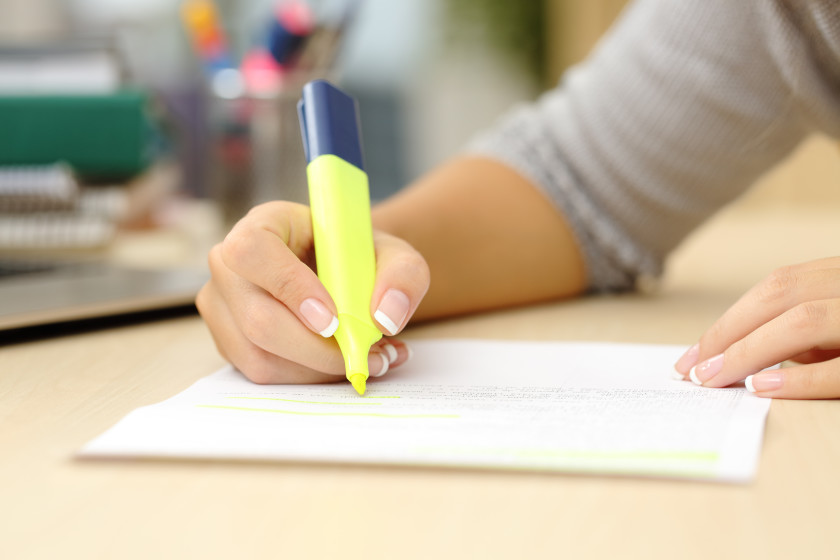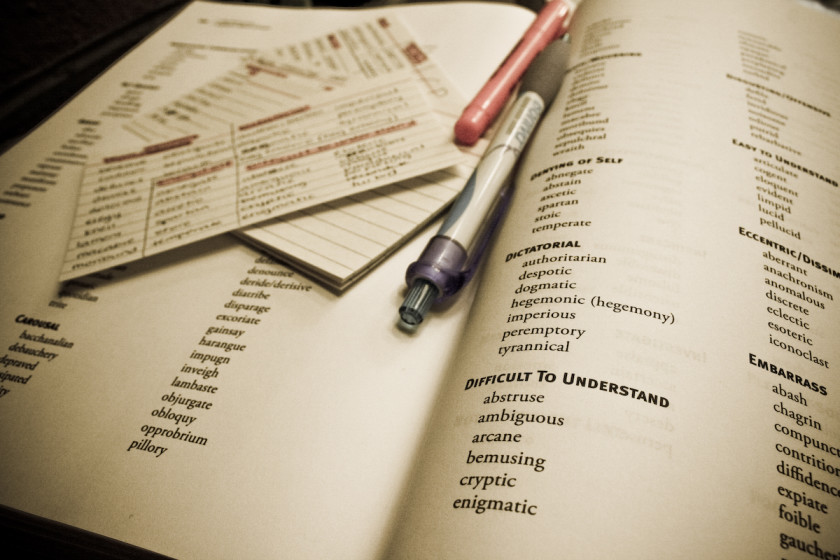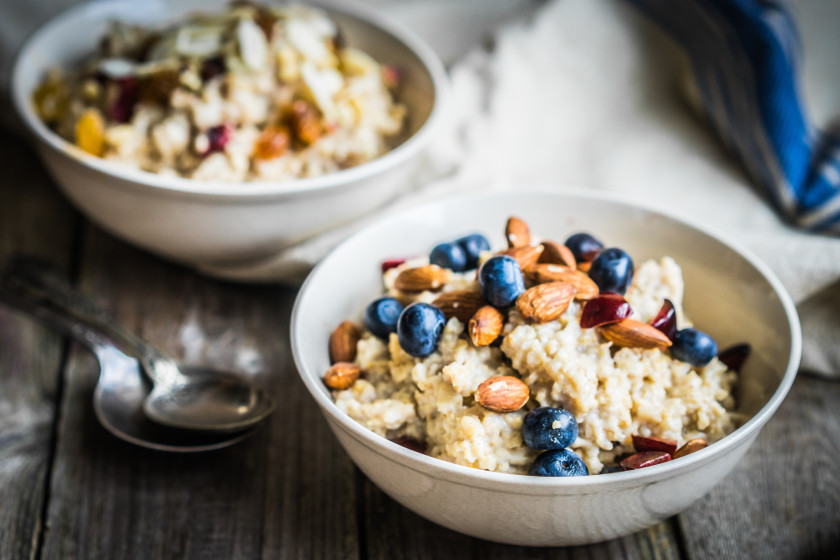If you’re a bit lost when it comes to revising for exams or writing essays, you’ll appreciate some expert guidance. These science-backed tricks will help improve your studying methods AND your grades in no time!
1. Take a highlighter hiatus

Many students rely on highlighters to mark important parts of text, whether it’s in weekly seminar readings or their own notes. But studies have shown that this method may actually hinder revision progress. According to Professor John Dunlosky, students are more likely to focus on one concept at a time if they identify phrases and words with a brightly coloured pen, making it more difficult to absorb the information as a whole or link key concepts together.
Instead of using highlighters, grab a big piece of paper and try to mind map the most significant points of the key texts you’ve read. Creating a visual map will help link the ideas together, and the physical action of writing and drawing will trigger your kinaesthetic memory.
2. Get into the swing of things

Pulling all-nighters may work for a very small handful of students, but unfortunately for the majority of people all-nighters generally equal lower grades. Research has proven that getting into a routine and setting yourself up to study at specific times of the day actually trains your brain to learn in those moments, making each and every revision session really count.
Some students work best in the morning, others in the evening — there is no right and wrong here. So find the routine that suits you, then make a study timetable and stick to it over the exam period. Your grades will thank you for it!
3. Testing, testing, 1, 2, 3…

Not only do practice tests increase your confidence before heading into the real exam, which in turn helps lead to better performance, they also improve your overall exam technique because you learn good pacing skills. By sitting down and taking a practice paper in exam conditions (that means no mobile phones, music or computers — just you, the questions, a pen and a clock to keep track of time), you’ll get a good idea of how the exam will be on the day and how you’ll divide your time. If a whole century of research proves that repeated testing works, the experts can’t be wrong.
4. Get flashy

Flashcards have been a fashionable study tool since a simple-yet-effective method was developed by German science journalist Sebastian Leitner in the 1970s. The Leitner system makes use of multiple flashcards organised into a box; if you manage to answer a card correctly, you file it into a section that will be revised less often, but if you give the wrong answer, the card is moved into a section to be revisited more frequently. This system is a highly effective way of prioritising your study topics in a logical manner and, better yet, means you can practise just about anywhere!
5. Break it down

Scientifically speaking, cramming is never constructive. Instead, it is much better for you to break your workload down into bite-size chunks. Research has proven time and time again that studying for shorter periods of time with regular rest intervals improves both concentration and memory capacity. Your brain is much better at encoding information into the synapses in short, repeated sessions, rather than one large one.
Think back to when you were younger and you learned to swim, ride a bike or play a musical instrument for the first time — you never perfected these skills in one day. So whether you’re memorising difficult maths equations or revising Spanish verb conjugations, remember to follow this technique!
6. Don’t let healthy habits slip

It’s always tempting to binge on junk food around deadlines, so you can spend more time studying and not cooking. But in reality, this is only going to have a negative effect on your brainpower. Taking the time out to cook is both a great way to give yourself a break from the books, and also to ensure your body is getting the nutrients it needs at this stressful time.
Top nutritionist Jo Lewin recommends opting for whole grains for a steady supply of energy, oily fish for healthy brain function, antioxidant blueberries and tomatoes for improving short term memory, and vitamins C and K in the form of blackcurrants and broccoli to increase mental agility and enhance cognitive function. And don’t forget to drink plenty of water to keep hydrated and help your brain work faster. Goodbye vending machines, hello straight A student!
7. Ditch the distractions

It has long been noted that listening to classical music while studying can have a very positive effect on students’ outcomes, with research carried out in France showing a huge difference in test results between students who listened to classical music during a one-hour lecture and those who didn’t. But this doesn’t ring true for all types of music, which can in fact be quite distracting.
Research by Nicole Dudukovic, who is psychology professor at Trinity College, Hartford in Connecticut, has shown that listening to music or texting friends while studying does not make you study better (despite the claims of many students).
So while you can boost your grades by listening to classical music, listening to Kanye West while studying just won’t have the same effect. Avoid distractions by switching off mobile phones and social media notifications during your designated study period to improve concentration.
8. Study in your sleep (no, really!)

Scientists at Northwestern University carried out an experiment to find out if playing sounds to sleeping participants would increase their memory of information learned listening to the same sounds while awake — and it turns out it really does work! If you want to follow this method, try associating sounds with revision cards during waking hours, and then playing those sounds back while you sleep to strengthen the memory.
For almost 200 years, researchers have believed sleep plays a vital role in learning, and now it has been confirmed. Names, faces, numbers and locations are consolidated in memory during deep sleep — hurray!
Other studies have also shown that by reviewing the most difficult topics just before sleeping the night before a big test makes them easier to recall on the day. But be warned, not getting enough sleep can lead to lower grades and impaired reasoning and memory for up to four days — yikes!
9. Exercise before you try tricky exercises

Your brain, like the rest of your body, changes and develops as you grow, and can decline if it’s underused. Studies have proven that even just 30 minutes of moderate aerobic exercise per day can improve cognitive function by 5-10% in adults. Not only is exercise also beneficial for attention span and information processing, but endorphins that are released during physical activity improve mood and sleep, and reduce stress and anxiety — win!
The best part of all, is that the exercise you do doesn’t need to be exhausting, as many of the studies carried out were based on participants walking briskly. So whether you put on your running shoes, roll out your yoga mat or throw on your swimming costume, just half an hour of exercise a day is all you need to keep your brain in good shape.
10. Comfort zone? Change it up

Of course it’s important to have a routine, and a big part of that routine should be where it is you decide to study. Research shows that if you study the same material every day, but change where you study, you’re more likely to remember it because your brain will be forced to form new associations with the information, strengthening the memory of it in the process.
So don’t stick at your bedroom desk, or even restrict yourself to studying in the library for that matter. Discover new places on campus to study like empty seminar rooms, or head to a (quiet) local café or even a friend’s house to mix it up.

This is a very insightful piece… Thanks alot,student.com. This has helped in restructuring some of my views towards studying
Very thoughtful. Thanks student.com
im so greatful with your counseling & guid toward succesful reading
This is very insightful. I can relate with the ones that emphasize the effect of sleep deprivation on reduced performance and many more. Thanks.
That’s absolutely a good constructive tips. Thanks @student.com. Now I can study and increase in confidence
That’s absolutely a good constructive tips. Thanks @student.com.
This is another algorithm that I have not come across before. Honestly , I never thought this short period of studies (time) and getting myself seriously buried with another activities can depreciate my brain power and those I must imployed for better grades……this is so lovely. Student.com
Thank you very much..this is really helpful.
Thanks a lot
Wow, I learnt some new studying techniques today… Thanks for sharing
Where have you guys been all my life? Thank you! You guys are just amazing!
Beautiful….. Tanks
Thanks for the list. I’ll certainly try them though I already know they’ll work.
its really cool.
thanks
Its amazing what one can accomplish with those little sets of information..
Its dope…. Thanks…its enlightening
Thanks for the tips
I learnt a lot so thanks!
Very interesting analysis.
Thanks much actually its a helpful in any aspects of education
Tnks alot student.com,fantastic articule
This is great, its really encouraging. Thumbs-up
Amazing and written with grace. Permission to post on my blog (Myimsu.com) for students of Imo State University, Nigeria to read.
Credits will be given to you.
Thanks
Like serious, I know It works. Thanks so much student.com.
Thanks @ students.com
Actually these are nice tips just discovered. More of it will be needed.
Hi – as you long as you link to our post rather than just copying and pasting and give credit, then of course that’s fine!
You make me well trained student to achieve good results this methods are so great